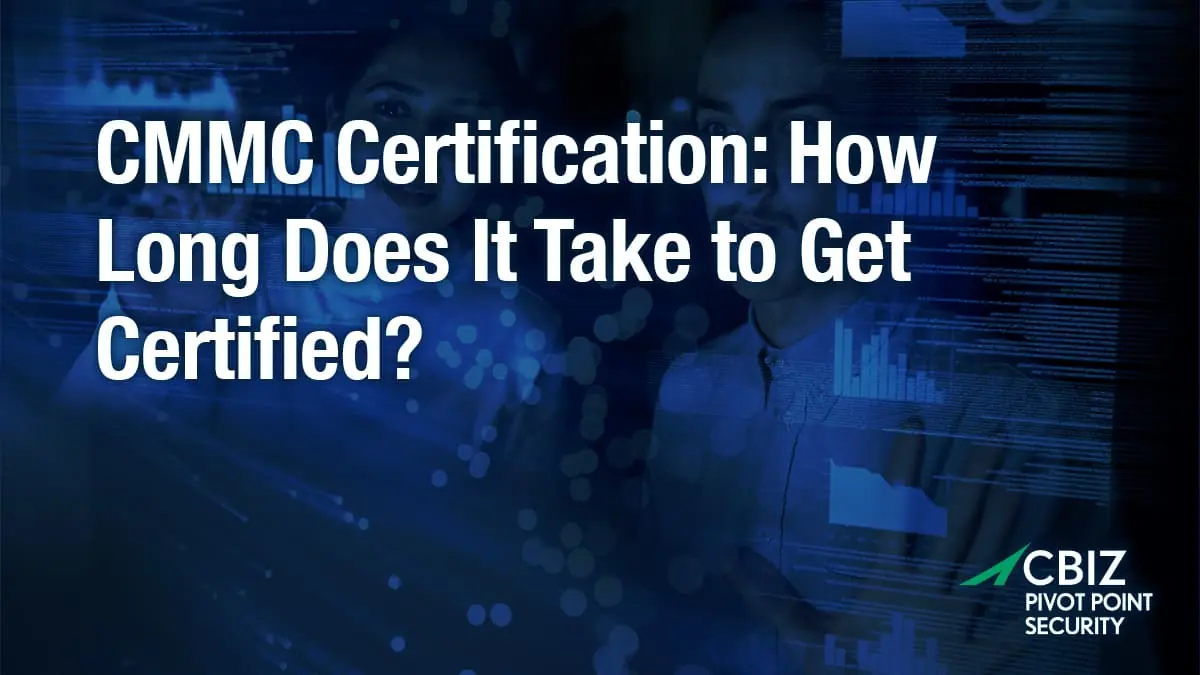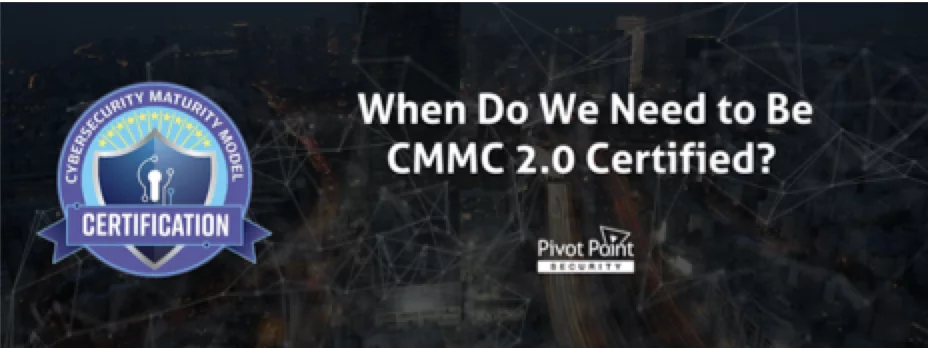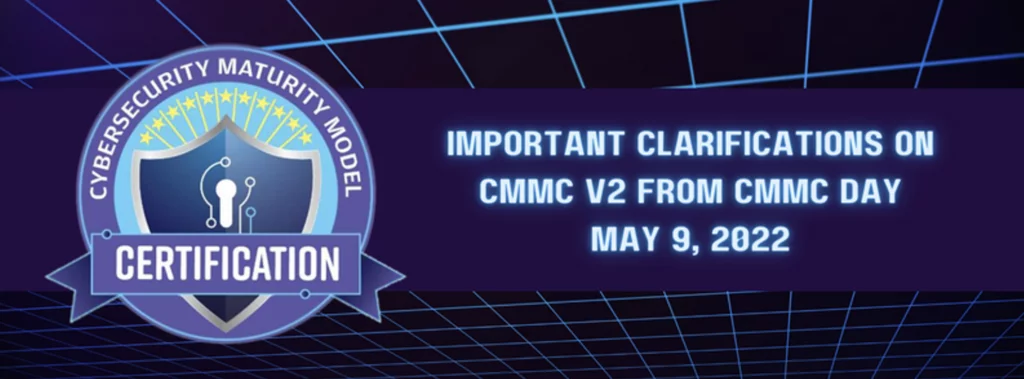Last Updated on January 31, 2025
Contractors in the US defense industrial base (DIB) are frequent cybercrime targets because their cybersecurity postures are generally weaker than those of the US Department of Defense (DoD) and its prime contractors. The result has been the catastrophic loss of intellectual property (IP) and other sensitive data, directly harming US national security and costing impacted organizations billions of dollars.
To address this longstanding problem, the DoD created the Cybersecurity Maturity Model Certification (CMMC), which mandates defense contractors to meet minimum cybersecurity standards and demonstrate compliance through a third-party assessment or rigorous self-attestation process. Approximately 75,000 DIB suppliers will need to achieve some level of CMMC compliance to participate in DoD contracts.
How long does it take to prepare for and achieve CMMC certification? The answer for your business depends on multiple factors, such as your current cybersecurity posture, company size, available resources, and more.
This article explores the CMMC certification process and preparatory steps, factors impacting a CMMC compliance timeline, and why now is the time to start moving forward if you haven’t already.
What are the steps to CMMC certification?
The CMMC certification process typically includes these steps:
- Identify the CMMC compliance level that your organization needs to bid on DoD contracts. The three levels are Level 1 (no CUI), Level 2 (if you handle CUI), or Level 3 (for higher security needs).
- The only auditor that can confer CMMC certification is a certified third-party assessment organization (C3PAO) registered with the Cyber AB, the official CMMC accreditation body. Connecting with a compatible C3PAO through the Cyber AB Marketplace and scheduling your assessment early could save you from dangerous delays later.
- If desired, find a reputable third-party consultant to help guide you to successful certification. The Cyber AB Marketplace lists Registered Provider Organizations (RPOs) for CMMC consulting.
- Complete a CMMC self-assessment exercise based on the CMMC assessment guidance to identify gaps and open issues to close before your C3PAO assessment.
- Once you are ready, schedule and undergo your C3PAO assessment.
- If your auditor finds nonconformities, your company has 90 days to address them.
- Once your assessment meets the criteria for your required CMMC level, the Cyber AB will issue your company a CMMC compliance certificate, good for three years.
With or without third-party consulting support, achieving CMMC certification requires organizations to make the following determinations about their cybersecurity environment:
| Step 1 | Identify what required CMMC controls are missing in your environment. | Gap analysis |
| Step 2 | Remediate your identified gaps and issues to achieve 100% CMMC control implementation. | Gap remediation |
| Step 3 | Confirm that your environment is CMMC compliant. | Internal audit |
| Step 4 | Undergo your independent CMMC certification assessment with your C3PAO. | External audit |
What factors impact a CMMC compliance timeline?
How long does CMMC certification take? Experience shows that a ballpark preparation timeframe to achieve NIST 800-171 compliance, equivalent to CMMC Level 2 compliance for companies that handle CUI, is 12 to 18 months. That is for a “typical” SME manufacturer with 50 to 500 employees and an “average” cybersecurity posture today.
Some organizations can get to “compliance ready” in as little as six months, while larger companies generally need at least a year.
Top factors that can impact your company’s CMMC compliance timeline include:
- The CMMC level you need to achieve to meet your contract requirements. The starting point of your CMMC journey is determining your goal CMMC level. If your company only deals with federal contract information (FCI), you can get by with CMMC Level 1 compliance, which requires only 17 basic controls. Most DIB contractors need to handle CUI, which mandates CMMC Level 2 with 110 controls. CMMC Level 3 will require approximately 130 controls depending on specific contract requirements.
- Your current cybersecurity maturity level. Firms with robust security practices based on a trusted framework like ISO 27001 or SOC 2 may only need to make a few adjustments to achieve CMMC compliance. A business with lax security controls will need to invest more time and money to implement a given CMMC level, especially CMMC Level 2 or CMMC Level 3.
- The size and complexity of your CMMC environment. Larger businesses with multiple systems and networks across multiple locations handling and transiting CUI, along with more staff processing CUI, will have a greater CMMC scope and probably need more time to prepare for a successful external certification audit.
- Your current cybersecurity tools. Some businesses have established cybersecurity tools and processes with custom integrations and other complexities that have significant CMMC compliance gaps (e.g., no email encryption). Retrofitting an existing cybersecurity environment to meet CMMC requirements can require not just incremental changes but an extensive technology retrofit. This can be time-consuming and difficult, especially because you need to avoid disrupting business processes.
- Availability of a C3PAO to perform your CMMC certification assessment. An estimated 75,000 DIB orgs will need to undergo CMMC certification. Yet as of November 2023 there were only 48 authorized C3PAOs, along with 459 candidate C3PAOs. Despite assurances to the contrary, there is likely to be a significant lag in availability of C3PAOs to perform CMMC certification assessments as demand massively increases after CMMC requirements begin appearing in DoD contracts.
- Hiring a third-party CMMC expert. Outsourcing the right elements of your CMMC program to a trusted advisor can help accelerate your timeline by eliminating missteps, filling skills gaps, and ensuring a consistent focus.
When will CMMC certification matter to our business?
The DoD is rolling out CMMC in a four-phase implementation process starting in late 2024 or early 2025 when DFARS rulemaking is completed. The current expectation is that CMMC requirements will start appearing in all solicitations issued on or after October 1, 2026.
However, some RFIs/RFPs may require CMMC self-assessments or third-party assessments (depending on the sensitivity of contract data) prior to that. The sooner your company is CMMC certified, the sooner you’ll be ready to bid on contracts—which could give you a competitive edge. Primes and contactors handling sensitive projects could expect new DFARS language as soon as the Final Rule is completed on or around Q2 2025 and could use the “Flow down” requirement as a lever to require other contractors to get CMMC certification sooner rather than later.
Some reasons to get “certification ready” ahead of the competition include:
- Prime contractors want their subcontractors to achieve CMMC certification (or the functionally equivalent NIST 800-171 compliance) as soon as possible to help land new contracts.
- To meet prime contractor demands, your top competitors will be angling towards the earliest opportunity to achieve full CMMC compliance.
- There will be orders of magnitude more organizations seeking certification (OSCs) than there are certified third-party assessment organizations (C3PAOs), which could severely crimp your assessment timeline. Even waiting until the start of the DoD’s phased rollout period to pursue CMMC certification could put you behind the curve due to this inescapable backlog.
Given the above factors, forward-looking contractors are aiming to be “CMMC assessment ready” by Q1 2025 when the DFARS rulemaking is final. If your business handles CUI and is not currently self-attesting to a perfect 110 score for NIST 800-171 compliance (equivalent control set to CMMC Level 2), you should close all gaps as soon as possible.
Remember that you will need to demonstrate the operation of controls over time to achieve the Cybersecurity Maturity Model Certification at Level 2, the minimum requirement for handling controlled unclassified information (CUI).
What’s next?
CBIZ Pivot Point Security offers a full complement of services to help organizations achieve and maintain compliance with the CMMC framework. With over 20 years’ experience helping organizations demonstrate security and compliance, you can trust that our team will ensure your successful CMMC certification.
Contact us to start a conversation with a CMMC expert.






















